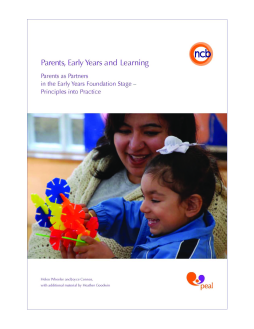
Additional Information
Book Details
Abstract
Getting parents involved in the learning of their young children in early years settings is critical: children learn from everything they experience, wherever they are and whoever they are with. The greater the continuity between home and setting, and the richer the learning environment in both, the more children will benefit.
This full-colour book provides accessible guidance for practitioners, explaining why parents need to be involved, what can prevent parental involvement, how to build respectful relationships, and how to ensure that involvement is a two-way process. It features practice examples for working with children and their families and provides ideas for those embarking upon new projects.
A well written and focused book, which includes the most relevant material relating to working with parents to date. All practice based which is what it should be all about.
Ally Dunhill, Programme Director, Centre for Educational Studies, University of Hull
Table of Contents
| Section Title | Page | Action | Price |
|---|---|---|---|
| Cover\r | Cover | ||
| Contents | v | ||
| Acknowledgements | vii | ||
| 1 Introduction | 1 | ||
| 2 The Early Years Foundation Stage: Parents as partners | 5 | ||
| Positive Relationships | 6 | ||
| Statutory Framework | 6 | ||
| 3 Why work with parents? | 9 | ||
| What parents do is more important than who parents are | 9 | ||
| Why is the impact of home learning in theearly years so strong? | 12 | ||
| 4 What stops parental involvement \rin learning? | 17 | ||
| Are some parents just not interested? | 17 | ||
| Factors that impede involvement | 18 | ||
| Parents’ experience of services | 19 | ||
| 5 Respectful relationships | 27 | ||
| Knowing more about families | 29 | ||
| Equal partnership | 37 | ||
| 6 Involvement at the heart of practice | 43 | ||
| Sharing regular two-way observations and supporting learning at home | 44 | ||
| Leadership, training and evaluation | 48 | ||
| Sharing educational aims and practice | 48 | ||
| Making everyone feel welcome – reaching out | 52 | ||
| PEAL model | 57 | ||
| 7 Practice examples | 59 | ||
| Sharing observations, knowledge and practice | 60 | ||
| Under threes | 76 | ||
| Getting out and about with parents | 80 | ||
| Taking learning into homes | 85 | ||
| Involving fathers | 89 | ||
| Transition to primary school | 91 | ||
| 8 Learning from PEAL | 93 | ||
| The PEAL journey | 93 | ||
| Learning into action | 100 | ||
| 9 Next steps | 105 | ||
| Think about what your setting already does with parents | 105 | ||
| Talk to parents in your setting | 105 | ||
| Start a project, no matter how small | 105 | ||
| Use PEAL training exercises in your setting | 106 | ||
| Go on further training | 106 | ||
| Appendix 1: PEAL practice example: Home visits | 108 | ||
| Appendix 2:What does your setting do with parents already? | 110 | ||
| Appendix 3: The PEAL team | 112 | ||
| References | 115 | ||
| Resources | 118 | ||
| Index | 125 |
